We have most of the books by Fleming Rutledge & Michael Gorman (see list below) on sale at a big savings. These deep discounts will only be offered through Wednesday, December 16, 2015.
After that they will revert to our customary BookNotes 20% OFF.
To receive the 35% off please type in the order form page the CODE 35% OFF.
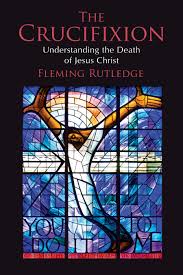 The Crucifixion: Understanding the Death of Jesus Christ Fleming Rutledge (Eerdmans) $45.00
The Crucifixion: Understanding the Death of Jesus Christ Fleming Rutledge (Eerdmans) $45.00
Sin is the colossal X-factor in human life. It is not something we do so much as it is our mortal foe. The Cross rears up over all human life because it is the scene of the God’s climactic battle against the Power of a malignant and implacable Enemy.
A few days ago Beth, our daughter Stephanie and I had the great privilege of hearing the respected and eloquent Episcopalian scholar, pastor and preacher, Fleming Rutledge, hosted by the Ecumenical Institute at St. Mary’s Seminary in Baltimore MD. One of the first women ordained into the Episcopal Church, she has served churches in New England and, for more than a decade, in New York City. She is known as an excellent preacher and as a particularly thoughtful, theologically moderate voice, calling us to live out sturdy faith, based on a serious awareness of the great tradition of historic Christian faith and generous orthodoxy. Which is to say, among other things, she is no fundamentalist, but resists the ways in which modernity has eroded conventional doctrines and core Christian convictions.
Here is an interview conducted by PBS from a few years back, even hinting that she is working on this finally released book (although you will notice she had, apparently, a different working title.)
As I’ve said, Dr. Rutledge is known around the world as a scholar and pastor, and she has several collections of sermons that have been published — including one on Romans that is excellent. She has twice been a resident Fellow at the Center of Theological
Inquiry in Princeton. In 2010 she was a Visiting Scholar at the
American Academy in Rome.
Her new book The Crucifixion: Understanding the Death of Jesus Christ, is getting considerable acclaim, and it was fabulous that the EI invited her. We are grateful to them for the opportunity to serve the gathering by displaying her books. Weighing in at 607 pages (including the footnotes and indexes) it is certainly a work to take seriously.
Here’s what Dr. Craig Higgins (a PCA pastor and board member of the World Reformed Fellowship) wrote in his recent review of the new book:
My friends who get their exercise by running often speak of experiencing
a “runner’s high”; I wouldn’t know. But I do know that, having just
finished Fleming Rutledge’s The Crucifixion, I am experiencing a
“reader’s high.” This book is simultaneously challenging &
captivating, demanding & exhilarating. Having finished it, I can’t
imagine not having read it.
“Reader’s high.” Nice, huh?
With exceptional Southern charm and self-confidence — I couldn’t help but think of Barbara Brown Taylor and her gracious forthrightness in sermons that are at once delightful and arresting — Fleming did not back peddle in her frustration with liberal theological trends that fail to grapple with the full teaching of Scripture or the horrors of our age of terror and genocide. The holiness of God? Wrath? Judgement? The “Assize” of God? The relationship of Christ’s death and Older Testament themes of Passover and Exodus? These are some of the themes we must work with when trying to understand Christ’s atoning death and vindicating resurrection, even if we dare not talk about them simplistically. “God has a case against us and the good news is that Christ is the advocate for the defense” she preached, and it was a thrilling moment! In a way, she sounded like a modern day Karl Barth, standing in that broadly described Reformed tradition.
This kind of theological work is complex, particularly since theological discussions are so polarized, these days; some in the church have overstated (and some understate or rule out altogether) such topics. One short book that generously brings many varied models and voices to the table is one in the “Living Theology” series edited by Tony Jones, A Community Called Atonement by Scott McKnight (Abingdon; $18.99.) I highly recommend that for an entry-level introduction. Much more complex, but an excellent overview of 10 different theories and approaches, is Saving Power: Theories of the Atonement and Forms of the Church by Dr. Peter Schmiechen (Eerdmans; $39.50) who is the former President of Lancaster Theological Seminary here in Central PA.
Further, provocatively, she suggests, few make a point of accounting for the gruesome, degrading, public manner of Christ’s death by crucifixion, “a mode of execution so loathsome that the ancient Romans never spoke of it in polite society.” How does this realization impact our faith, our discipleship, our ethics? As many have observed, this is academic, but not too much so; it is aimed at clergy and educated congregants, not mostly the academic or scholarly world.
Rev. Dr. Rutledge attempted, and largely succeeded, her daunting task, presenting a brief overview of the new 670 page tour de force, The Crucifixion: Understanding the Death of Jesus Christ It is a book that she has been working on, on and off, well, she said, “for really, a lifetime.” It is a comprehensive study, analyzing both what the Bible teaches about the public execution of Jesus and the various schools of thought which attempt to explain it, and the rectification — what a word! –that it brings. There has been a flurry of books in the last decade about this topic and numerous texts examining and proposing a new emphasis or framework. I’ve read a number, but often come back to the very helpful, broad-ranging and readable book by John Stott, my favorite major book on the subject, The Cross of Christ (InterVarsity Press; $27.00.) Dr. Rutledge names that one in her book, as well.
Her’s is truly one of the most magisterial works on the subject in our lifetime.
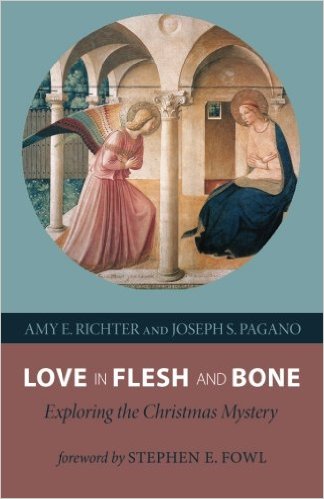 There were two respondents to Dr. Rutledge’s lecture; first, Dr. Amy Richter, who wrote an exceptional book on the role of bodies in Christian theology, an Advent study, really, about the implications of the incarnation called Love in Flesh and Bone: Exploring the Christmas Mystery (Wipf & Stock; $17.00.) Rev. Richter not only teaches New Testament at the Ecumenical Institute but is also a parish priest, so her very gracious evaluation of Rutledge’s lecture and book include appreciation for how pastoral helpful it was. I appreciated this.
There were two respondents to Dr. Rutledge’s lecture; first, Dr. Amy Richter, who wrote an exceptional book on the role of bodies in Christian theology, an Advent study, really, about the implications of the incarnation called Love in Flesh and Bone: Exploring the Christmas Mystery (Wipf & Stock; $17.00.) Rev. Richter not only teaches New Testament at the Ecumenical Institute but is also a parish priest, so her very gracious evaluation of Rutledge’s lecture and book include appreciation for how pastoral helpful it was. I appreciated this.
The heady and thick discussion about various schools of thought regarding the atonement yield fruitful insights that pay off in lived practices, and pastors and church leaders can more profoundly respond to the ethical demands of our faith in the modern world if we are well schooled in classic theology. Richter observed – and Fleming was passionate about this in her response – that her insistence on a robust view of justification reverberates into habits and practices of just living in a fallen world. (It is a shorter book by a more conservative author, but I suspect Rutledge and Richter would appreciate Tim Keller’s Generous Justice: How God’s Grace Makes Us Just on how the doctrine of justification should compel us to be people of justice.)
 Rutledge reminded us that we must be outraged, dealing with the register of radical evil. “The story of Jesus,” she says, “has cosmic implications” and surely one of these is that it gives us ways to understand the gravity of sin and the victory Christ wins over the ways of Death. (My favorite book of hers is a collection of Holy Week messages, responding to great Christian art, called The Undoing of Death, and she well understands the cosmic reverberations of that. It makes me think of the line by Sam in Lord of the Rings who wonders if “everything sad will become untrue.” Indeed, in light of holocausts and terrorism and gross racism and mass starvation and modern slavery and on and on, we need the undoing of Death!) Richter is right — Rutledge is not just a stern Bible scholar, but a caring pastor who hopes this sturdy stuff will help us navigate these hard times, not falling for “cheap” reconciliation or shallow hopes. She gave a nod to Miroslov Volf, in fact, as one scholar who has worked on this matter. (Just think of his important Exclusion and Embrace: A Theological Exploration of Identity, Otherness, and Reconciliation.)
Rutledge reminded us that we must be outraged, dealing with the register of radical evil. “The story of Jesus,” she says, “has cosmic implications” and surely one of these is that it gives us ways to understand the gravity of sin and the victory Christ wins over the ways of Death. (My favorite book of hers is a collection of Holy Week messages, responding to great Christian art, called The Undoing of Death, and she well understands the cosmic reverberations of that. It makes me think of the line by Sam in Lord of the Rings who wonders if “everything sad will become untrue.” Indeed, in light of holocausts and terrorism and gross racism and mass starvation and modern slavery and on and on, we need the undoing of Death!) Richter is right — Rutledge is not just a stern Bible scholar, but a caring pastor who hopes this sturdy stuff will help us navigate these hard times, not falling for “cheap” reconciliation or shallow hopes. She gave a nod to Miroslov Volf, in fact, as one scholar who has worked on this matter. (Just think of his important Exclusion and Embrace: A Theological Exploration of Identity, Otherness, and Reconciliation.)
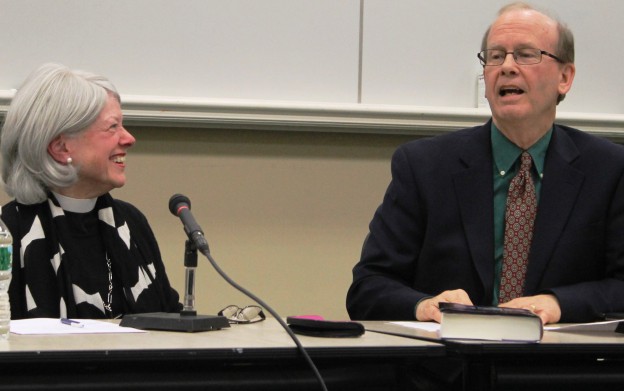 Ecumenical Institute Professor and Bible scholar Michael Gorman gave a splendid response to Rutledge, too, and shared several areas in which her views works well alongside his own, the highly acclaimed and very important Pauline books such as Cruciformity: Paul’s Narrative Spirituality of the Cross and the recent Becoming the Gospel: Paul, Participation, and Mission. (In fact, one of the last
Ecumenical Institute Professor and Bible scholar Michael Gorman gave a splendid response to Rutledge, too, and shared several areas in which her views works well alongside his own, the highly acclaimed and very important Pauline books such as Cruciformity: Paul’s Narrative Spirituality of the Cross and the recent Becoming the Gospel: Paul, Participation, and Mission. (In fact, one of the last 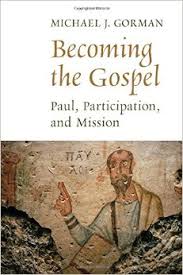 chapters in her book is called “Recapitulation, Incorporation, Participation” which I believe helps the conversation about substitution move towards a broader, Kingdom framework, as Gorman and his friend Tom Wright, for instance, have done in their scholarly treatises. Gorman liked that her book starts with the credo from 1 Corinthians 2:2 “I decided to know nothing among you except Jesus Christ and him crucified.” Rutledge seemed to suggest that if she were to do a follow up – her editors advised her to cut a third of the book out, moving the content to another, subsequent work – that it would be something along the lines of Cruciformity with an emphasis of how all this works out in daily discipleship for the life of the world.
chapters in her book is called “Recapitulation, Incorporation, Participation” which I believe helps the conversation about substitution move towards a broader, Kingdom framework, as Gorman and his friend Tom Wright, for instance, have done in their scholarly treatises. Gorman liked that her book starts with the credo from 1 Corinthians 2:2 “I decided to know nothing among you except Jesus Christ and him crucified.” Rutledge seemed to suggest that if she were to do a follow up – her editors advised her to cut a third of the book out, moving the content to another, subsequent work – that it would be something along the lines of Cruciformity with an emphasis of how all this works out in daily discipleship for the life of the world.
Rutledge disagrees with Wright in his criticisms of what some call the “Apocalyptic School” of Pauline interpretation — in part formed by the scholar Ernest Kasaemann. (Rutledge studied at Union in New York under St. Mary’s most famous former professor, the late Raymond Brown who was influential as well.) This “apocalyptic” interpretive grid influences her New Testament work, bringing her into conversation with, although somewhat different from, N.T. Wright’s now famous views of justification informed by his interpretation of “righteousness” in Paul seen as “covenant faithfulness.” Yet, she is fair and mostly quite thorough in her evaluations and debates with others. (Her footnotes are exceptional, and she discusses everyone from Ridderbos to Girard, from William Placher to Douglas John Hall; she said, jokingly, “doing the names and subject indexes almost killed me.”) The book demanded a tremendous balancing act, holding up the big themes of Christus Victor and themes of justification, sacrifice, substitution (although not “penal”) and recapitulation.
Beyond a detailed overview, more than only a balancing act, this book — or so it seems to me – is offering a new sort of “blending” and reformulation of classic, important stuff, in important, contemporary ways. She works with the classic writings of the church Fathers, the medieval scholastics, and the Reformers as well as much 20th century scholarship, from Bonhoeffer and Barth to Desond Tutu. The Christus Victor motif and the concept of substitution merges with Ieanaeus’ recapitulation model. And through it all, she draws in insights from literature such as Flannery O’Connor and Walker Percy and her beloved Shakespeare. This is, quite simple, one of the most amazing books on this topic I’ve ever seen.
 And I am not alone in raving.
And I am not alone in raving.
Here is a very thoughtful, thorough review. I am announcing it, inviting you to buy it, but I realize I haven’t really evaluated it. Here is a very fine review for your consideration.
The many, many endorsements in the front pages are stellar, commending the book – on and on they go, from many quarters, affirming its value and importance.
Here are a few that I invite you to read carefully. This is truly one of the most acclaimed works of its kind in years.
Stanley Hauerwas
— Duke Divinity School
“This is a work of a lifetime that could only be written by someone who has lived a life determined by the cross.”
Scot McKnight
— author of The Jesus Creed
“In this amazingly complex but clear book Fleming Rutledge goes deftly where few seem willing to go — to the variety of imaginations shaping early Christian explorations of the significance of Jesus’ death. She is one of the few theologians who not only preach inclusivism but practice it by inviting all points of view into the discussion.”
Marilyn McCord Adams
— Rutgers University
“To those who think they want a maximally mellow God who overlooks our faults and accepts us just as we are, Rutledge’s challenge is to ‘get real.’ Twentieth-century atrocities bear witness: there is something drastically wrong with the human condition, which only God can fix. Setting things right calls for crucifixion, not only Christ’s but also ours. Rutledge has given us a very Pauline book, full of information and observations to provoke clergy to preach the cross to their congregations.”
Leanne Van Dyk
— Columbia Theological Seminary
“Before we can get to the glorious resurrection, we must take full account of the tragic necessity of the cross. . . . Penetrating and unflinching in its insistence on Jesus Christ, condemned, crucified, dead, and buried, this book powerfully demonstrates that the crucifixion of the Son of God is good news of cosmic and comprehensive scope.”
Richard J. Mouw
— Fuller Theological Seminary
“Though I have been thinking much about the cross of Christ for a half-century now, Fleming Rutledge has taught me many new things in this wonderful book. And where she addresses matters that I have long cherished, she has inspired me anew. This book is a gift to all of us who pray for a genuine revival of crucicentric preaching and cruciform discipleship!”
George Hunsinger
— Princeton Theological Seminary
“After publishing numerous books of powerful sermons, remarkable for their biblical depth and their contemporary relevance, Fleming Rutledge has now produced this profound volume on the saving significance of Christ’s death. She makes the welcome argument that Christus Victor themes need to be counterbalanced by priestly elements like substitution and expiation. . . . Here is the kind of strong theology that will undergird strong preaching. Preachers who take this book to heart could well revitalize the church.”
Katherine Sonderegger
— Virginia Theological Seminary
“Fleming Rutledge here lays out the horror of the cross with unflinching honesty and with a patient, full exposition of the rich themes of Christ’s redeeming death. She does not shy away from the demands of her theological vision, taking up motifs of satisfaction, substitution, rectification, and divine wrath in turn. Throughout, Rutledge draws on the rich storehouse of a preacher. The whole world stands under her gaze — literary examples, political folly and cruelty, horrendous evils of war and torment and torture, religious timidity and self-deception, human faithlessness and sin. But always the gospel rings out. Christ’s cross has won the victory, and it is all from God. This book is a moving testimony to the courage, intelligence, and faithfulness of one of the church’s premier preachers. Every student of the Scriptures needs this book.”
John D. Witvliet
— Calvin Institute of Christian Worship
“A deeply probing and richly evocative exploration of the central mystery of the Christian faith. This is a book to contemplate, to savor, to reread. It promises to nourish renewed Christian preaching, a new generation of Christian poets and hymnwriters, and ministries of witness, evangelism, pastoral care, worship, and Christian education that brim with doxological testimonies about the counter-intuitive, counter-cultural reality of Jesus’ life-giving death. It is easy to glibly repeat Paul’s claim that Jesus’ death is a scandal and stumbling block. It is quite something else to let that claim transform how you perceive the world and the triune God who created it. This book confronts all that is glib and evokes that life-giving transformation.”
Mark Galli
— editor of Christianity Today
“I can hardly think of a book more necessary for our time. Many well-meaning attempts to summarize the good news today barely allude to the cross, and we’re left with an anemic if not a false gospel. Read, mark, and inwardly digest this book if you want to learn about the cross that truly rectifies the ungodly, even the likes of you and me.”
Paul Scott Wilson
— University of Toronto
“In beautiful flowing words, Fleming Rutledge encourages the church to get over its often embarrassed silence on the crucifixion. Her immediate accomplishment is brilliant. She recovers a rich array of biblical images relating to Christ’s death and places them within the final stages of a drama in which God is the principal actor and humanity has a vital role. Persistent readers will find their hearts transformed. Preachers will be emboldened to speak more frequently of the cross, contributing to the gospel renewal of the church.”
Nicholas Wolterstorff
— Yale University
“The word that came to my mind as I read Fleming Rutledge’s book The Crucifixion was ‘bracing’: the book is bracing in its vigorous affirmation of the centrality of Christ’s crucifixion in the Christian proclamation, bracing in its description of the unspeakable horror and shame of the crucifixion, bracing in its affirmation that we are one and all sinners, bracing in its identification and rejection of the many forms of theological silliness now inhabiting the church. Though meant for pastors and laypeople, this book will also benefit scholars. It carries its deep learning with eloquence and grace. I will be returning to it.”
J. Louis Martyn †
— Union Theological Seminary
“In the crucifixion we sense anew the intersection at which Christian drama and Christian dogma meet one another with announcements that are emphatically universal and nothing less than cosmic. At that intersection we are truly fortunate to have the voice of Fleming Rutledge, one of the most gifted theological preachers of our time. In her writing we encounter the confluence of high drama and arresting dogma, as they work together to strengthen the preacher and provide a high-protein diet that will nourish the congregation to vigorous health.”
Stephen Westerholm
— McMaster University
“If churches of the twenty-first century are to bear any relation to those of the first, then the cross of Christ must return to the center of their proclamation and life: that, in essence, is the message of Fleming Rutledge’s Crucifixion, a book that should serve to mediate much contemporary biblical scholarship on the subject to ministers and other interested readers. Unlike a good deal of that scholarship, however, Rutledge treats a variety of New Testament motifs that speak to the salvific effects of Christ’s death, refusing to allow any one motif to so dominate the discussion as to exclude the others. Richly illustrated with examples from literature and current events, this book should prove a gold mine for preachers at the same time as it invites the careful reflection of every reader on the mystery of salvation.”
Douglas Harink
— The King’s University, Edmonton, Canada
“In this bold, uncompromising, nuanced, and expansive work Rutledge takes us through — and beyond — theories of atonement, avoiding all merely individualistic, spiritualized, religious, moralistic, and therapeutic reductions of the meaning of the crucifixion. Rutledge resolutely proclaims the truth of Christ crucified. To all priests, preachers, and professors: if you care about the church and its mission in history, read this book!”
Joseph Mangina
— University of Toronto
” ‘Who put the roses on the cross?’ asked Goethe, who in fact preferred that the brutal cross be covered in roses. Fleming Rutledge brushes the roses aside and asks us to look at the cross and, even more so, at Him who hung upon it for our sake. This is a book marked by outstanding exegesis, theology, and pastoral sensitivity — a book for thinking Christians and even thinking unbelievers.”
Martinus C. de Boer
— VU University Amsterdam
“In this thoroughly readable book, preacher-theologian Fleming Rutledge demonstrates that she is also a fine exegete. She brings recent scholarship on Paul’s apocalyptic theology (in particular the work of J. Louis Martyn) fruitfully to bear in her profound and far-ranging theological reflections on the crucifixion. Through careful exegetical study of the Bible in dialogue with a range of interpreters, she has produced a book that merits a wide readership among theologians, biblical scholars, and preachers.”
Dirk Smit
— University of Stellenbosch, South Africa
“Fleming Rutledge’s reputation as a preacher is widely known, her rhetorical skills — of logos, ethos, and pathos; of content, engagement, and passion — widely respected. This treatment of the crucifixion — the fruit of almost two decades, and indeed of a lifelong journey — could in fact also be read as one long sermon. . . . What does it mean to say that Jesus Christ died for us? Honestly facing her own resistance to many traditional and contemporary framings of this question, she consults widely and delves deeply into biblical, historical, and interpretive material in search of her own answers. . . . Informing, reminding, critiquing, illustrating, unmasking, challenging, reassuring, encouraging, and inspiring, she writes for both preachers and listeners. The question Will it preach? is in fact her major concern. The answer can only be a resounding and grateful Yes!”
HERE ARE THE BOOKS WE HAVE ON SALE AT THE LIMITED TIME OFFER – 35% OFF (After Wednesday 12/16/15 they remain at 20% off for BookNotes readers.)
BY FLEMING RUTLEDGE

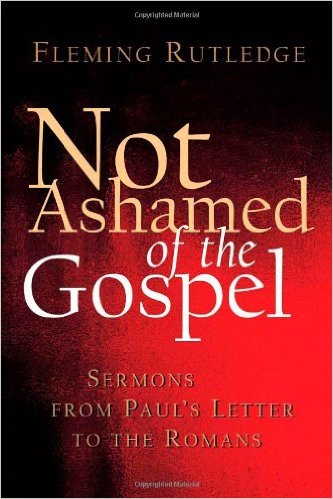

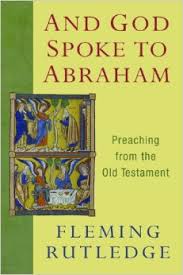
The Crucifixion: Understanding the Death of Jesus Christ (Eerdmans) $45.00 — $29.25
Not Ashamed of the Gospel: Sermons from Paul’s Letter to the Romans (Eerdmans) $22.00 – $14.30
The Undoing of Death (Eerdmans) $22.00 – $14.30
And God Spoke to Abraham: Preaching from the Old Testament (Eerdmans) $30.00 – $19.50
BY MICHAEL GORMAN


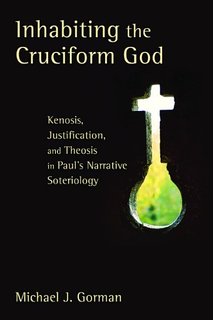
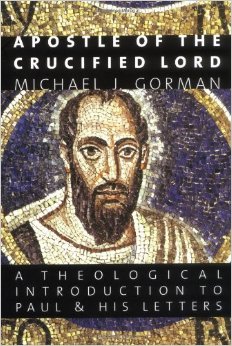
Becoming the Gospel: Paul, Participation, and Mission (Eerdmans) $28.00 – $18.20
Cruciformity: Paul’s Narrative Spirituality of the Cross (Eerdmans) $38.00 – $24.70
Inhabiting the Cruciform God: Kenosis, Justification, and Theosis in Paul’s Narrative Soteriology (Eerdmans) $25.00 – $16.25
Apostle of the Crucified Lord: A Theological Introduction to Paul and His Letters (Eerdmans) $44.00 – $28.60
BookNotes
35% OFF
DISCOUNT
three days only
thru
12-16-2015
(After 12-16-15 we offer them at a 20% off.)
order here
takes you to the secure Hearts & Minds order form page
just tell us what you want
inquire here
if you have questions or need more information
just ask us what you want to know
Hearts & Minds 234 East Main Street Dallastown, PA 17313 717-246-3333
